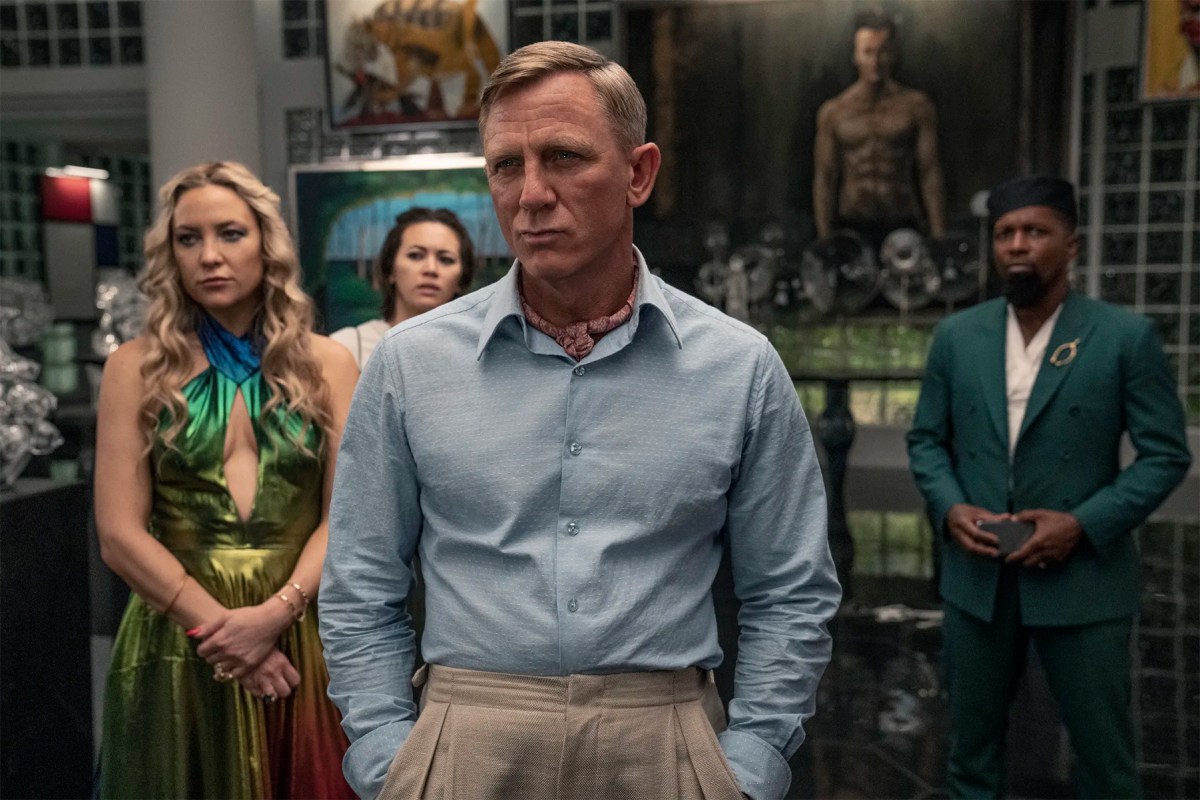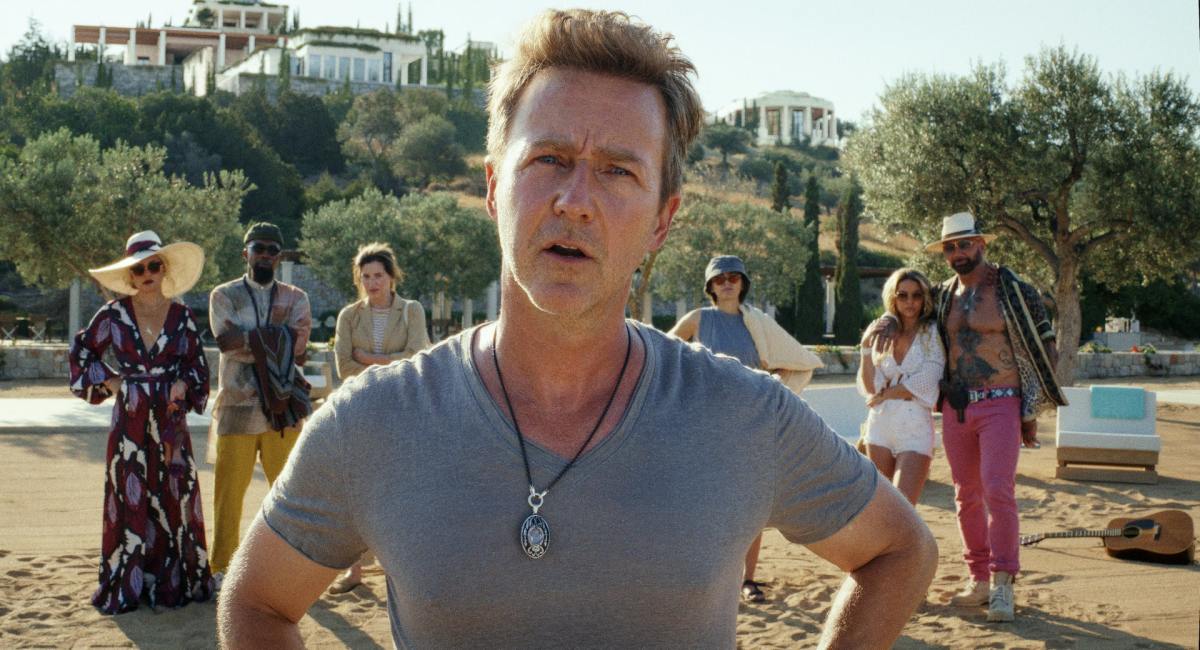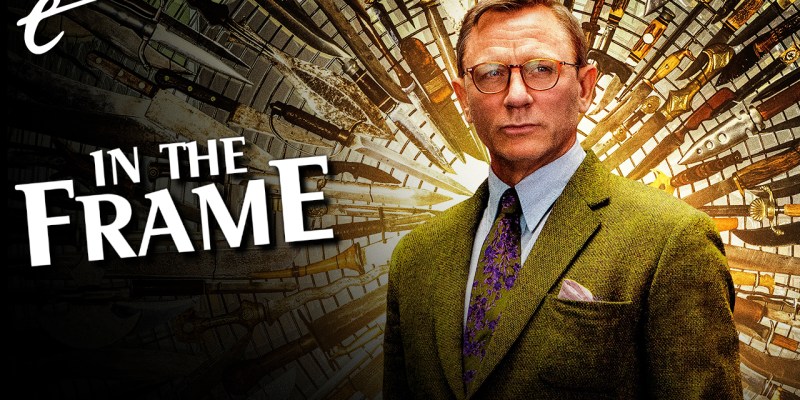This discussion contains minor spoilers for Glass Onion: A Knives Out Mystery, the latest Benoit Blanc mystery from Rian Johnson. It also contains major spoilers for Knives Out.
In the middle of Knives Out, gentleman sleuth Benoit Blanc (Daniel Craig) neatly explains the mechanics of the classic “whodunnit” mystery to Marta Cabrera (Ana de Armas).
Blanc describes his process in technical terms, invoking Thomas Pynchon’s Gravity’s Rainbow. “I anticipate the terminus of gravity’s rainbow,” he boasts. Confessing that he has not actually read the novel, he reframes the concept as a physical law. “It describes the path of a projectile, determined by natural law,” he elaborates. “Voilà, my method. I observe the facts, without biases of the head or heart. I determine the arc’s path, stroll leisurely to its terminus, and the truth falls at my feet.”
This is a very rational and dispassionate way to describe the structure of a mystery. “Be it cruel or comforting, this machine unerringly arrives at the truth,” Blanc asserts. “That’s what it does.” By this logic, justice is an impersonal force. Blanc himself is an outside observer with no emotional investment in the case. In Knives Out, Blanc only shows an interest in the death of Harlan Thrombey (Christopher Plummer) because he received a mysterious invitation with “an envelope of cash.”
Writer and director Rian Johnson returns to this idea in the opening scenes of the sequel, Glass Onion. Tech billionaire Miles Braun (Edward Norton) invites several old friends to a murder mystery weekend at his private island. The invitation comes encased in a mystery box, a contraption that requires the recipient to solve a series of elaborate puzzles to open each of the layers. The invitation reveals itself only after all the riddles have been answered, encased in a shining silver bulb.

There’s a hermetically sealed quality to this idea of mystery fiction. It is also appealing. There is a neatness in the belief that guilt and innocence adhere to some external logic and that there are a set of criteria that can be applied in order to determine some objective truth. If the world is a puzzle box, it can always be unlocked. There is always one right answer, and one doesn’t have to worry about more abstract concepts like morality or decency.
The beauty of both Knives Out and Glass Onion is that both movies understand the central fallacy of this appealing fiction. The world is never that simple. It is not a carefully designed puzzle box that can be reduced to a set of inputs and outputs that dispenses justice as an end result. It would be simpler and easier if it did. It takes Blanc the entire runtime of Glass Onion to solve the movie’s central mystery, but he casually cracks Braun’s neatly constructed murder mystery plot over dinner.
The characters in both Knives Out and Glass Onion live in protected spaces. Thrombey is a hugely successful author of murder mysteries, who has used his wealth to transform the house that he bought from a Pakastani real estate agent into something Detective Lieutenant Elliott (LaKeith Stanfield) describes as “a Clue board.” Braun lives on a private estate, where he can afford to hire Gillian Flynn to write murder mysteries for him and receive private coaching from Serena Williams.
Glass Onion is built around the fallacy of assuming that systems designed by the rich and powerful can ever hold them to account, that a mystery box designed at Braun’s behest can ever actually reveal the truth. Throughout Glass Onion, Braun asserts control of the mystery narrative, trying to shape the story to suit his own interests. Braun ships out those mystery box invitations to his guests. Braun is the center of his own murder mystery party.

There is a central irony to the character of Miles Braun — a tech billionaire who positions himself as “a disruptor” but ultimately relies on the system to protect his vested interests. The plot’s inciting incident is Braun’s use of the legal system to disinvest his business partner Cassandra Brand (Janelle Monáe). He does this by lying in open court about the source of their company’s tech innovations, by manipulating their friends to perjure themselves under oath in service of his own interests.
The truth is that these structures always bend to the whims of the wealthy. In Knives Out, the Thrombeys get into a heated debate over immigration. “You wanna become an American, there are legal ways to do it,” asserts Richard Drysdale (Don Johnson). “But if you break the law, it doesn’t matter if you have a good heart — you gotta face the consequences.” Of course, the family makes exceptions for those in their orbit, insisting that Marta came to America “the right way.”
These concepts are elastic and shift depending on what the family wants in a given moment. When Marta becomes a threat to the Thrombey family, inheriting Harlan’s wealth, Walt Thrombey (Michael Shannon) shows up to threaten her mother with deportation and offers to use the family’s resources to protect her. Later, implicated in attempted murder and arson of a medical examiner’s office, Ransom Drysdale (Chris Evans) boasts he’ll “be out in no time” thanks to his “good lawyer.”
There is something subversive in how both Knives Out and Glass Onion approach the structure of the classic murder mystery, often unraveling and blowing it apart. The death of Harlan Thrombey sparks Knives Out but is revealed as a suicide. The plot of the movie becomes an elaborate series of intersecting and incompetent schemes, a disjointed comedy of errors in which there is no single architect of the central crime. In fact, the central crime may not have actually happened, legally.

Ransom tried to poison his grandfather by swapping his meds. However, Marta instinctively gave him the right medicine only to then panic after reading the label Ransom had swapped on to it. Assuming that he had been poisoned, even though he hadn’t, Harlan took his own life. Though Ransom later murders the housekeeper Fran (Edi Patterson) and tries to murder Marta to cover up his involvement, Knives Out is a murder mystery in which the central murder isn’t a murder at all.
Glass Onion escalates this approach. The movie sets up what seems to be a compelling hook: A billionaire invites a bunch of friends to his estate for a murder mystery weekend. The unspoken assumption is that Braun will be murdered at some point over the course of the trip. Instead, Glass Onion twists and turns. It’s almost an hour before any character dies on screen, and then it is revealed that the murder that Blanc is attempting to solve actually took place weeks earlier.
As such, both Knives Out and Glass Onion shred the conventional structures and assumptions of the classic “whodunnit” murder mysteries. Indeed, by the time that Glass Onion begins, Blanc himself seems to have little interest in that conventional and rigid structure. “You must be really good at Clue, huh?” Brand asks Blanc at one point. He gets upset. “I’m very bad at dumb things,” he protests. “Ticking boxes, running around, searching all the rooms. It’s just a terrible, terrible game.”
There’s no small irony in this. Brand and Blanc initially try to solve the case in Glass Onion using the logic of Clue. Brand has a notebook, ticking boxes against names. During a blackout on the island, with Blanc distracting the other guests, Brand runs around searching all the rooms. This approach has little success, in large part because Blanc severely underestimates how dumb his opponents are. For Blanc, the key to the puzzle comes with a five-word revelation: “Miles Braun is an idiot.”

This is the key to both Knives Out and Glass Onion, and what distinguishes Benoit Blanc from many other classic murder mystery detectives. Blanc is a humanist. For all his rhetoric about the mechanics of mystery-solving, Blanc believes in people. He spots a bloodstain on Marta’s shoe early in Knives Out, implicating her in Harlan’s death. However, he sticks close to her and protects her because he determines that she has “a good heart.” That belief guides Blanc more than any material evidence.
Beneath his polished exterior, beneath the “Southern hokum” that he layers on to befuddle the rich and powerful, there is a righteous anger driving Benoit Blanc. Both Knives Out and Glass Onion build to cathartic moments when Blanc finally gets to express his unbridled contempt for the people he is investigating, describing the Thrombeys as “a pack of vultures” and giving voice to his frustration with Braun’s abuse of the English language with words like “embreathiate” and “reclamation.”
This anger is understandable. Johnson has acknowledged that anger is a key motivator for him as a writer, conceding, “I’m always creatively driven to put what I’m angry about at the moment into movies.” Both Knives Out and Glass Onion exist as part of a larger modern canon of movies channeling righteous anger at the super-wealthy, from Ready or Not to The Menu. Blanc’s anger is a key part of his character, one that evolves across both movies.

Knives Out confronts the fallacy of the investigator as a dispassionate outside observer. Blanc understands there is a greater moral justice, transcending the legal structures the wealthy manipulate to their own ends. Glass Onion pushes this further. It initially seems like Blanc has arrived at Braun’s gathering at the behest of some outside party, as he was summoned to Harlan Thrombey’s suicide. However, Blanc is revealed as a much more active participant this time around.
Glass Onion is an appreciably angrier movie than Knives Out. Like The Menu, another film about the horrors of capitalist exploitation, Glass Onion ends with a remote island retreat consumed by flames. Blanc acknowledges the limits of his “jurisdiction” in this case and the inability of the legal system to hold these sorts of people to account. However, he also intrinsically understands that there can only be one truly just outcome to this case.
Glass Onion signals as much in its opening scene. After a charming montage in which Braun’s friends and colleagues collaborate to open their mystery boxes, the film cuts to Brand considering this strange gift. She contemplates it for a moment, before walking off-screen. She returns with a hammer and proceeds to tear the box apart. She has no interest in its puzzles or mysteries. They are a distraction. The hammer gets right to the heart of it. It breaks the whole thing wide open.
One gets the sense that Blanc would approve.
